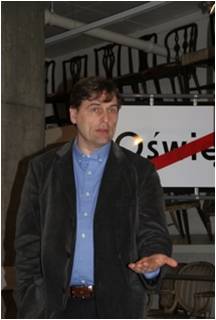 Dr. Phil. Søren Brier
Dr. Phil. Søren Brier
(born 1951) is Professor in the Semiotics of Information, Cognition and Communication Sciences at the Centre for International Business Communication Studies at Copenhagen Business School, where he has been teaching philosophy of science as well as semiotics on five different communication programs.
MSc in biology from University of Copenhagen, Ph.D. in Philosophy of Science at University of Roskilde and Doctor (Habil) of Philosophy at CBS, he is the founder and editor of the interdisciplinary quarterly journal Cybernetics & Human Knowing, a fellow of the American Society for Cybernetics and is awarded with The Warren McCulloch Award; member of the board of Int. Ass. For Biosemiotic Studies and its Journal Biosemiotics as well as scientific board member of The Science of Information Institute and Foundation of Information Science and of several scientific journals.
His research interest focussed on the transdisciplinary foundation for the interplay between cybernetic and systemic information science and Peircean triadic semiotics also in its modern development as a part of biosemiotics.
What fascinates you about your field of research?
“Research in transdisciplinarity is so important for us to be able to solve our knowledge integration problems. The field is heading towards creating non-reductionist frames that will integrate qualitative and quantitative research and reflect on the limits of scientific knowing.
I consider Charles Sanders Peirce and Niklas Luhmann’s previous and Basarab Nicolescu’s present work on transdisciplinary and combinations of it the most promising and groundbreaking work in this area.
A major global challenge is to prevent war among cultures by make the qualitative and quantitative sciences integrate their work and from the limitations of that enter into a dialogue with the core search of all religions.”
We recommend to enter his field of expertise through these selected writings:
Cybersemiotics: Why Information is not Enough, U. of Toronto Press, 2008, 2010, paperback 2013
Brier S. (2008b):“A Paradigm for Biosemiotics”, Signs 2008, pp. 30-81. http://vip.db.dk/signs/artikler/Brier%20(2008)%20the%20paradigm%20of%20peircean%20biosemiotics.pdf
Brier, S. (2008c). A Peircean Panentheist Scientific Mysticism. International Journal of Transpersonal Studies; vol. 27, p. 20-45 http://www.transpersonalstudies.org/ImagesRepository/ijts/Downloads/A%20Peircean%20Panentheist%20Scientific%20Mysticism.pdf
Brier, S. (2010). Cybersemiotics and the Question of Knowledge, Chapter 1 in Dodig-Crnkovic , G. and Burgin, M. Information and Computation. World Scientific, http://www.idt.mdh.se/ECAP-2005/INFOCOMPBOOK/CHAPTERS/1-Brier.pdf
Brier, S. (2009): Cybersemiotic Pragmaticism and Constructivism, Constructivist Foundations 5(1): 19-39. http://www.univie.ac.at/constructivism/journal/5/1/019.brier
Brier, S. and Joslyn, C. (2013a). “What Does It Take to Produce Interpretation? Informational, Peircean, and Code-Semiotic Views on Biosemiotics”. Biosemiotics, Vol. 6, Nr. 1, 04.2013, s. 143-159.
111. Brier, Søren (2013b). Cybersemiotics: a new foundation for transdisciplinary theory of consciousness, cognition, meaning and communication, in Liz Swan (Ed.)(2012): Origins of Mind, Springer book series in Biosemiotics, Berlin, New York: Springer: Pp. 97-126
Brier, Søren (2013b): Cybersemiotics: A New Foundation for Transdisciplinary Theory of Information, Cognition, Meaningful Communication and the Interaction Between Nature and Culture, Integral Review: A transdisciplinary and transcultural journal Volume 9, No. 2, 220-263 http://www.integral-review.org/current_issue/index.asp
Brier, S. (2013c). Transdisciplinary view of Information theory seen from a Cybersemiotics point of view, in Ibekwe-San Juan, F. and Dousa. T. (2013): Fundamental notions of information, communication and knowledge: Its effects on scientific research and inter-disciplinarity, New York and Berlin: Springer: Pp 23-49.



